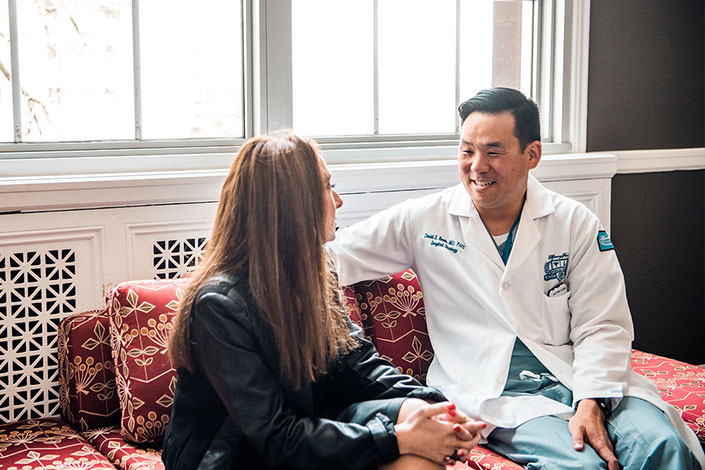Pancreatic Cancer Research and Clinical Trials
 Experts at Henry Ford Cancer are making strides toward improving pancreatic cancer prognosis. Our physicians and researchers have been at the helm of pioneering treatment breakthroughs that are improving quality of life. We are also leading international efforts toward diagnosing the disease earlier and helping people live longer.
Experts at Henry Ford Cancer are making strides toward improving pancreatic cancer prognosis. Our physicians and researchers have been at the helm of pioneering treatment breakthroughs that are improving quality of life. We are also leading international efforts toward diagnosing the disease earlier and helping people live longer.
Newly diagnosed?

Internationally renowned pancreatic cancer research
 Pancreatic cancer is typically detected in later stages when it’s challenging to treat or untreatable. Patients are often too sick to tolerate life-saving therapies, which is part of why prognosis is so poor. But experts at the Henry Ford Pancreatic Cancer Center are advancing care possibilities through research. The center is home to a team of world-class physicians and researchers.
Pancreatic cancer is typically detected in later stages when it’s challenging to treat or untreatable. Patients are often too sick to tolerate life-saving therapies, which is part of why prognosis is so poor. But experts at the Henry Ford Pancreatic Cancer Center are advancing care possibilities through research. The center is home to a team of world-class physicians and researchers.
Our interests include everything from the basic biological processes of pancreatic cancer cells to treatment outcomes. We have had a hand in key research activities that are advancing scientific knowledge in many aspects of care. Through publications and speaking engagements, we share this information with experts all over the world.
We are also influencing national pancreatic cancer research initiatives at the highest level. Our experts participate in prominent organizations, like the National Cancer Institute (NCI) Pancreas Cancer Task Force. This group and many others we participate in help set clinical trial research priorities for leading programs, such as the one at Henry Ford.
Pancreatic cancer care advances at Henry Ford
When new care methods become available, you’ll often find them at the Henry Ford Pancreatic Cancer Center. Our pioneering efforts include:
- First program in Michigan offering NanoKnife®: In eligible patients, this treatment uses electrical pulses to destroy inoperable pancreatic tumors. Before NanoKnife’s FDA approval, we were among the first in the country to evaluate it through clinical trials.
- First program in the country offering MRI-guided radiation therapy: This method uses imaging to direct high doses of radiation to precisely the right spot. We are leading a pivotal clinical trial demonstrating its effectiveness before it becomes widely available.
- Among the first in the nation offering a vaccine trial: We were among a small number of programs to utilize a phase I clinical trial evaluating a pancreatic cancer vaccine. Phase I trials are the earliest opportunity for people to receive new therapies. This vaccine uses inactive tumor cells to trigger an immune system response and attack cancer cells.
Pancreatic cancer clinical trial opportunities
If you are eligible for a clinical trial and wish to participate, we explain everything you need to know. You also receive additional support from nurses who help you have a safe experience. Find out more about pancreatic cancer clinical trials.
CL-SBP-101: A Randomized, Double-Blind, Placebo Controlled Study of Nab-Paclitaxel and Gemcitabine with or without SBP-101 in Subjects Previously Untreated for Metastatic Pancreatic Ductal Adenocarcinoma
Principal Investigator: Dr. Philip Philip
SWOG-2001: Randomized Phase II Clinical Trial of Olaparib + Pembrolizumab vs. Olaparib as Maintenance Therapy in Two Cohorts of Metastatic Pancreatic Cancer Patients with Germline BRCA1 or BRCA2 Mutations
Principal Investigator: Dr. Haythem Ali
A021806: Phase III Trial of Perioperative Versus Adjuvant Chemotherapy for Resectable Pancreatic Cancer
Principal Investigator: Dr. David Kwon
BNT321-02: A Phase I/Randomized Phase II, OpenLabel Multicenter Trial to Evaluate the Safety, Tolerability, and Efficacy of mFolfirinox with or without BNT321 as Adjuvant Therapy Following Curative Resection in Patients with Pancreatic Adenocarcinoma
Principal Investigator: Dr. Philip Philip
TAS-120-206: A Phase 2 Study of Futibatinib in Combination with PD-1 Antibody-based Standard of Care Therapy in Patients with Solid Tumors
Principal Investigator: Dr. Gazala Khan
Some of the largest financial gifts in the country for pancreatic cancer research
Our research has been made possible in part due to generous funding from an anonymous donor, and we’re incredibly grateful. In 2018, Henry Ford received a $20 million grant and in 2020, another $16 million gift from the same donor. These gifts are funding innovative research efforts that will have a global impact.
The global pancreatic cancer research consortium at Henry Ford
 The Henry Ford Pancreatic Cancer Center is bringing together the world’s most innovative minds to accelerate discovery for early detection and new therapies. Our team, led by clinical director David S. Kwon, MD, FACS, and scientific director Howard Crawford, PhD, is leading novel research efforts.
The Henry Ford Pancreatic Cancer Center is bringing together the world’s most innovative minds to accelerate discovery for early detection and new therapies. Our team, led by clinical director David S. Kwon, MD, FACS, and scientific director Howard Crawford, PhD, is leading novel research efforts.
We are working with pancreatic cancer specialists all over the world to:
- Uncover early biological changes (biomarkers) that lead to pancreatic cancer
- Support a biorepository where we store blood and tissue samples for future research efforts
- Grow cell models (organoids) to support drug development for people’s unique tumors
- Perform sophisticated data analysis to identify potential patterns in cancer development and treatment response
.svg?iar=0&hash=F6049510E33E4E6D8196C26CCC0A64A4)

/hfh-logo-main--white.svg?iar=0&hash=ED491CBFADFB7670FAE94559C98D7798)